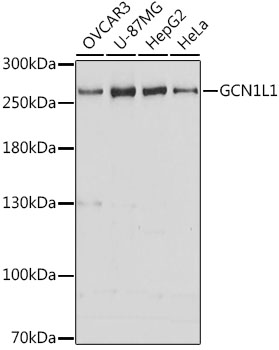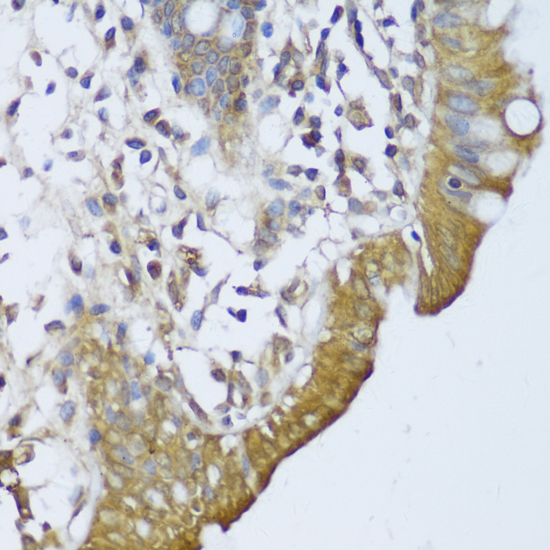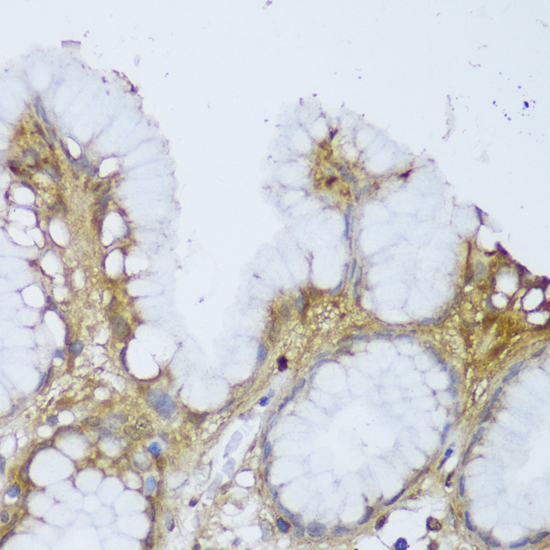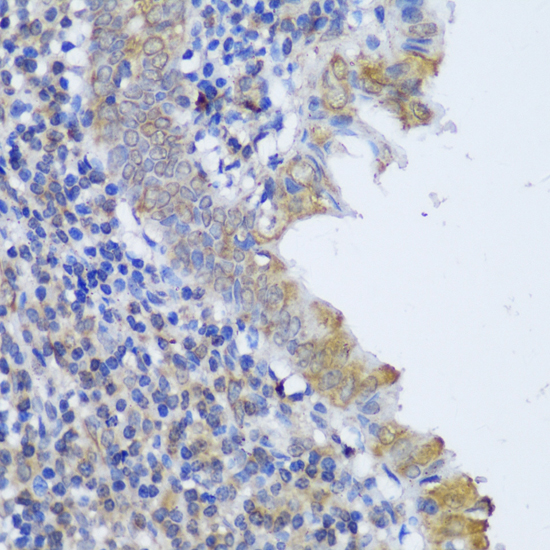-
Product Name
GCN1L1 Polyclonal Antibody
- Documents
-
Description
Polyclonal antibody to GCN1L1
-
Tested applications
WB, IHC
-
Species reactivity
Human
-
Alternative names
GCN1 antibody; GCN1L antibody; GCN1L1 antibody; PRIC295 antibody; eIF-2-alpha kinase activator GCN1 antibody
-
Isotype
Rabbit IgG
-
Preparation
Antigen: Recombinant fusion protein containing a sequence corresponding to amino acids 2462-2671 of human GCN1L1 (NP_006827.1).
-
Clonality
Polyclonal
-
Formulation
PBS with 0.02% sodium azide, 50% glycerol, pH7.3.
-
Storage instructions
Store at -20℃. Avoid freeze / thaw cycles.
-
Applications
WB 1:500 - 1:2000
IHC 1:50 - 1:200 -
Validations

Western blot - GCN1L1 Polyclonal Antibody
Western blot analysis of extracts of various cell lines, using GCN1L1 antibody at 1:3000 dilution.Secondary antibody: HRP Goat Anti-Rabbit IgG (H+L) at 1:10000 dilution.Lysates/proteins: 25ug per lane.Blocking buffer: 3% nonfat dry milk in TBST.Detection: ECL Basic Kit .Exposure time: 30s.

Immunohistochemistry - GCN1L1 Polyclonal Antibody
Immunohistochemistry of paraffin-embedded human colon using GCN1L1 antibody at dilution of 1:150 (40x lens).

Immunohistochemistry - GCN1L1 Polyclonal Antibody
Immunohistochemistry of paraffin-embedded human stomach using GCN1L1 antibody at dilution of 1:150 (40x lens).

Immunohistochemistry - GCN1L1 Polyclonal Antibody
Immunohistochemistry of paraffin-embedded human appendix using GCN1L1 antibody at dilution of 1:150 (40x lens).
-
Background
Acts as a positive activator of the EIF2AK4/GCN2 protein kinase activity in response to amino acid starvation. Forms a complex with EIF2AK4/GCN2 on translating ribosomes; during this process, GCN1 seems to act as a chaperone to facilitate delivery of uncharged tRNAs that enter the A site of ribosomes to the tRNA-binding domain of EIF2AK4/GCN2, and hence stimulating EIF2AK4/GCN2 kinase activity. Participates in the repression of global protein synthesis and in gene-specific mRNA translation activation, such as the transcriptional activator ATF4, by promoting the EIF2AK4/GCN2-mediated phosphorylation of eukaryotic translation initiation factor 2 (eIF-2-alpha/EIF2S1) on 'Ser-52', and hence allowing ATF4-mediated reprogramming of amino acid biosynthetic gene expression to alleviate nutrient depletion.
Related Products / Services
Please note: All products are "FOR RESEARCH USE ONLY AND ARE NOT INTENDED FOR DIAGNOSTIC OR THERAPEUTIC USE"
